| Lindback and Provost's Awards—Sketches of the 2010 Winners |
|
April 20, 2010, Volume 56, No. 30
|
|
Since 1961, Lindback Awards—for members of the standing faculty—have been a springtime tradition at Penn.
The Provost’s Awards—for full- and part-time associated faculty and academic support staff—have also been given in conjunction with the Lindbacks since 1988. Another University-wide award to honor faculty who teach and mentor doctoral students was begun in 2003 for members of the standing or associated faculty in any school offering the PhD. Below are profiles and excerpts from colleagues’ and students’ letters of recommendation for this year’s winners.
Teaching Award Reception: April 26
All members of the University community are cordially invited to a reception
honoring the recipients of the
Christian R. and Mary F. Lindback Foundation Awards for Distinguished Teaching
and the Provost’s Awards for Teaching Excellence by Non-Standing Faculty
as well as the Provost’s Awards for Distinguished PhD Teaching and Mentoring
Monday, April 26 at 5 p.m. Bodek Lounge, Houston Hall
|
Lindback Awards |
|
Non-Health Schools
|
Health Schools
|
Provost's Awards
|
Christian R. and Mary F. Lindback Awards at the
University of Pennsylvania:
Awarded for Distinguished Teaching
The Lindback Awards for Distinguished Teaching at the University of Pennsylvania were established in 1961 with the help of the Christian R. and Mary F. Lindback Foundation. Christian Lindback was president and principal of Abbotts Dairies, Inc. and a trustee of Bucknell University. The Foundation established Lindback Awards for Distinguished Teaching at colleges and universities throughout the Abbotts Dairies, Inc.’s service area in New Jersey, Pennsylvania, Maryland, Delaware and Virginia.
See www.archives.upenn.edu/people/notables/awards/lindback.html for the previous recipients.
|
Lindback Awards–Non-Health Schools
John Dilulio, SAS
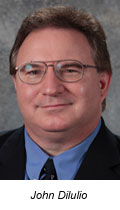 |
John DiIulio, Frederic Fox Leadership Professor of Politics, Religion, and Civil Society and Professor of Political Science in the School of Arts and Sciences, has taught at Penn since 1999. Founding Director of the White House Office of Faith-Based and Community Initiatives and founder of Penn’s Robert A. Fox Leadership Program, he is, in the words of colleagues, “a Penn icon before his time” who is “as gifted a teacher as he is a gifted scholar and solid citizen.” In large classes and small, he aims at “building and strengthening the bridge between learning and students’ civic lives … teaching begins in the classroom, but it isn’t done until students incorporate the lessons into their own lives and then act on them.” His students testify not only to his skills as a scholar and teacher, but above all to his dedication to changing how they think about their lives: “He engages students with material in a way that makes them question how the issues that affect our world relate to them, and what they can do to affect change.” In the words of another student, “His class taught me not only about political science, but also about how to live life … to the fullest, about how to find the courage to fight the current.”
|
Zachary Ives, SEAS
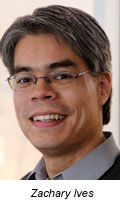 |
Zachary Ives, Associate Professor of Computer and Information Science in the School of Engineering and Applied Science, has taught at Penn since 2003. He has been a leader in curricular innovations, developing courses on internet and database systems in which students build their own search engines or database-powered websites. “I never imagined an individual student could achieve so much,” said one student. A recent alumnus who works at Google echoes, “there is not a day that goes by at my job that I do not take into consideration the skills and information that I learned in Professor Ives’ class.” His students and colleagues admire both his intellectual mastery (which he also applies as the undergraduate chair of the school’s new program in Market and Social Systems Engineering) and his dedication to advising and mentoring students. “Professor Ives,” in the words of one student, “cares tremendously about preparing his students for the outside world and, more important, helping them realize their power and potential. … I feel confident of tackling any challenge, academic or otherwise, and feel a sense of pride of being a student from the University of Pennsylvania.”
|
Eugene Mele, SAS
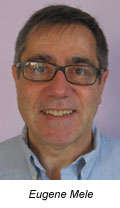 |
Eugene Mele, Professor of Physics in the School of Arts and Sciences, has taught at Penn since 1981. A condensed matter theorist, he shows students “how physics is a great story,” with “his ability to draw out little paradoxes” and “force us to use the combination of our reason and our previous knowledge.” He has been instrumental in restructuring the undergraduate physics curriculum and has taught the department’s full range of undergraduate and graduate courses, with a focus on undergraduate physics majors and beginning graduate students. He “consistently exceeds all reasonable expectations in accommodating his students,” and those students note his talent “for illustrating abstract concepts with relevant and clear examples.” “He’s taught me how to think about physics,” reports one student, echoed by another who said, “I relearned how to learn. … By fostering a connection between the theory and the real world, he taught us how to intuitively approach future problems and obtain problem-solving skills that are applicable to any field of study.” As a student sums up, “I have often compared watching Professor Mele deliver a lecture to watching a small kid in a candy shop: a grin breaks out on his face as he talks about physics, and as he moves enthusiastically from one topic to the next, we can feel a sense of contagious energy that shows his eagerness to teach his subject.”
|
Laura Perna, GSE
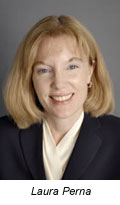 |
Laura Perna, Associate Professor in the Graduate School of Education, began teaching at Penn in 2005, after a career spanning research, government, and undergraduate degrees from Wharton and SAS. She is an expert in access to higher education for members of historically underrepresented groups, including women, racial and ethnic minorities, and those of lower socio-economic status. Her students note that she “has high expectations but gives students the support needed to achieve them.” In the words of another student, “she has high expectations for all of her students, yet is also strongly committed to working with students collaboratively to meet those expectations.” She “challenged her students to embrace quantitative analysis, consider real-world applications of theory and research, and improve our writing skills.” In particular, she encourages students to appreciate the importance of quantitative methods and statistics, “frequently responding to students’ comments with, ‘That’s great, now could you restate that idea using a sentence with numbers in it?’ Dr. Perna taught us to get over our feelings of intimidation of large number sets and support our statements with quantitative evidence.”
|
Lindback Awards–Health Schools
Judith Aronchick, Medicine
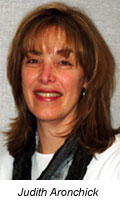 |
Judith Aronchick, Associate Professor of Radiology in the School of Medicine, has taught at Penn since 1983. “One of the most inspiring and effective teachers at Penn,” she coordinates medical student education in radiology and spearheads the department’s initiatives to innovate its curriculum, currently leading an effort to design a comprehensive new four-year academic program. Students praise her abilities to offer “refreshingly clear and coherent” explanations of complex concepts, draw connections between radiology and other disciplines, understand each student individually, and inspire them either to pursue careers in radiology or to understand the importance of radiology to their own specialties. Students single out her legendary “hot seat” technique of having a student join her in front of the class to interpret films, “imploring us to think on our feet and come up with rational deductions … in a manner in which she nicely—and frequently with humor—leads the student down the correct path to discover the answer and enable the student to make the connections.” Whether or not students specialized in radiology, they felt “by the end of the course,” that it “was so essential to their medical school education that it would be unimaginable to graduate without the benefit of her teaching.”
|
Jonathan Korostoff, Dental Medicine
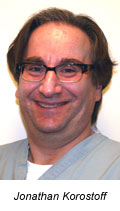 |
Jonathan Korostoff, Associate Professor-Clinician Educator in the Department of Periodontics in the School of Dental Medicine, has taught at Penn since 1993. Through a wide range of courses, reports a colleague, “he views the students as his future colleagues, respects them, and is intent on providing them with a first-class, up-to-date education.” Those students report that he “routinely arrives at school before anyone else and is most often the last to leave” and will go any lengths to “deliver challenging course material in a way that was both fun and effective,” including using props, PowerPoint slides that “are clear, colorful, and to the point,” and having students act out scenarios. “Whether it was volunteering to give review sessions before exams or offering to meet with students one-on-one, he made it clear that he wanted everyone to learn the material he presented and …he was willing to put in the extra effort and time outside of class to make sure they did.” On one occasion, he re-taught a two-hour class in the evening because the majority of the class had to miss it for an anatomy exam. “He is always there when we need him to be … has always supported our ideas, always stood by the students, and truly lives his profession for us.”
|
Marilyn Sommers, Nursing
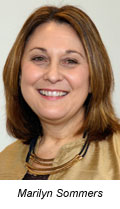 |
Marilyn Sommers, Lillian S. Brunner Professor of Medical-Surgical Nursing in the School of Nursing, has taught at Penn since 2006. “Dr. Sommers’ career,” in the words of a colleague, “integrates research, teaching, service, and clinical practice, and she demonstrates this seamlessly to students. She brings each element to the classroom and none in isolation.” A nationally recognized expert in injuries, especially those related to sexual assault, risk-taking behaviors, and vulnerable populations, she received her own undergraduate nursing degree from Penn and teaches the full range of nursing students. “It is well known,” indicates a graduate student, “that she advocates for students and has students’ best interests at the forefront.” In the Senior Inquiry course, taken by every undergraduate nursing student, students regard her as “supportive, accessible, inspiring, and always challenging students to think in new ways.” As another student reports, “Her door is always open, no matter how busy her day has been. … She expects a lot of her students … , but she expects more of herself.” She is “mentoring every moment,” says a colleague, echoing a student’s account that “she seemed to delight in the fact that I was learning and growing as a young investigator. … No other professor has ever placed my priorities so high on their own list of priorities.”
|
Robert Weinrieb
Robert Weinrieb, Associate Professor of Psychiatry in the School of Medicine, has taught at Penn since 1993. Students praise his ability to listen closely to them and to patients, while conducting thorough and persuasive diagnoses. “Patients tell him stories that they don’t even tell their families and friends,” and he is equally skilled at mentoring his students with “genuine concern and kindness,” in ways that are “accessible, empathic, and caring without losing his objectivity and rigor.” As one of them indicates, “He taught us more … than how to assess and treat psychiatric patients; he taught us about how to approach and relate to any patient, and to people in general.” Numerous students testify that his example motivated them to become psychiatrists, as he “inspires students to choose psychiatry as a career through his teaching and dedication to patient care.” As one alumnus sums up, “Dr. Weinrieb taught me that doctoring doesn’t have to be just a method. It can be an art.”
|
Provost’s Award for Teaching Excellence by Non-Standing Faculty
In October of 1987, the Office of the Provost announced the establishment of two additional Penn teaching awards—one in a Health School and one in a Non-Health School—to be given annually in recognition of distinguished teaching by associated faculty or academic support staff. The guidelines for the selection of the award recipients are the same as those given for the Lindback Awards, and the selection processes and deadlines are the same.
|
Brian Keith, SAS
 |
Brian Keith, Adjunct Professor of Biology in the School of Arts and Sciences, has taught at Penn since 1999. He created and teaches the department’s 400-level undergraduate course on Cancer Cell Biology, in a style that “can simultaneously be described as coherent, inspiring, informative, succinct, and exuberant.” His students praise him for encouraging both critical analysis and open discussion. “Dr. Keith is the only professor I’ve met who really did not seem to believe in stupid questions,” reports one student, echoed by another who reports that, “review sessions before a test were always full of discussion, as students were not so focused on memorizing items out of the textbook, as they were to really understanding the multitude of pathways that lead to cancer.” Students were also encouraged to perform in-depth analysis of scientific research, “to make us think about the paper critically and not just assume that everything presented to us was complete fact.” In short, “if I were to choose one professor to resemble all that Penn is about, I would nominate Dr. Keith. His class has transformed my understanding of biology, my view on life, and my analytical skill.”
|
Carolyn Cambor, Medicine
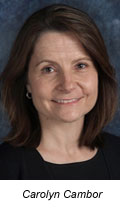 |
Carolyn Cambor, Associate Professor of Clinical Pathology and Laboratory Medicine in the School of Medicine, has taught at Penn since 1998. She specializes in medical education for undergraduates and first-year medical students, in which areas she has developed innovative new courses and curricula, “has won an unbelievable 18 teaching awards,” and “is recognized as a leader … on a national level … in the development and implementation of novel and unique methods of medical education.” In the words of a colleague, “she is as gifted on the ‘macro’ level of developing new curriculum initiatives as she is on the ‘micro’ level of student interaction.” Students praise her “vast pathology knowledge,” combined with her ability to communicate pathology as “an integral part of a medical education.” As one student notes, she is “an incredible advocate for her field … even after her course was finished, Dr. Cambor has continued working to establish opportunities and avenues for us to explore different areas of pathology.” As another student reports, “She always made educating students a priority—both inside and outside the classroom,” making her “the epitome of a clinician educator” and, in the words of an admiring colleague, “THE consummate teacher … the teacher’s teacher!”
|
Provost’s Award for Distinguished Ph.D. Teaching and Mentoring
Excellence in PhD education is the hallmark of a great university. That excellence depends upon the skill and commitment of faculty mentors. The Provost’s Award for Distinguished PhD Teaching and Mentoring was established specifically to honor faculty who mentor PhD students. The prize is intended to underscore the University’s emphasis on graduate education, by celebrating the accomplishments of faculty who show special distinction in doctoral education.
|
Margreta de Grazia
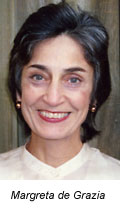 |
Margreta de Grazia, Rosenberg Professor of the Humanities and Professor of English in the School of Arts and Sciences, has taught at Penn since 1983. An internationally recognized scholar of Shakespeare and Renaissance literature, “she stands,” in the words of a colleague, “for an enviable combination of field specialization with intellectual breadth and ambition,” mentoring students not only in her own field but also in a wide range of other areas. As another colleague indicates, “it is no exaggeration to say that,” among her former students, “six are among the top fifteen younger scholars in the world who have been redefining the field.” Dozens of current and former students attest to her tireless and rigorous devotion to scholarship and to mentoring the next generation of scholars. “I find it hard to imagine,” notes a PhD student, “how a scholar who has produced such important work in her field can manage to devote as much of her time and energy to her students.” A “tough and gifted mentor,” she is “the interlocutor that I imagine everyone, of any level, field or discipline wants—but especially graduate students: she demands intellectual accountability … radiating intensity, both warm and severe—who seemed to gracefully embody … exacting and exciting standards.” As one student sums up: “Margreta has taught me about the kind of scholar I want to be—not because she is so successful in her field, but because, in her unceasing engagement with her students’ intellectual lives, she embodies what it means to teach.”
|
Renata Holod, SAS
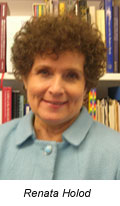 |
Renata Holod, College for Women Class of 1963 Term Professor in the Humanities,
History of Art Department
Curator, Near East Section, University Museum of Archaeology and
Anthropology, has taught at Penn since 1972. A pioneering scholar of Islamic art, she has overseen 40 dissertations in almost 40 years. As one of her students-turned-colleagues notes, “she has trained and placed more doctoral students in the Islamic art and architecture field … than any other graduate program.” She is “utterly tough and utterly selfless,” she is “that rare professor whom one encounters only once in one’s lifetime,” she is “ridiculously generous with her time and talents, whether you are ‘officially’ her student or not,” and she is “the person I turned to again and again when grappling with the larger implications of my project.” She is legendary for her intellectual and pedagogical force, and for her devotion to helping students plan their studies and careers, often decades past graduation. “For every chapter I turned in, she invited me to her home … where she would sit with me and work through every page, every paragraph, every word of text.” As one former student notes, “Dr. Holod is an institution that, like a cellular telephone network, travels with you. … Like few academics, Dr. Holod has a charismatic ability to turn life into scholarship and scholarship into life. … She has transformed all her students’ lives.”
|
|